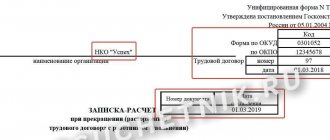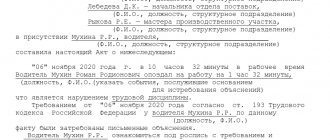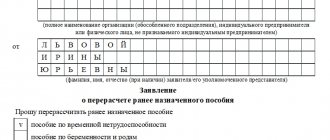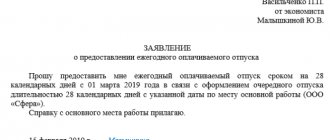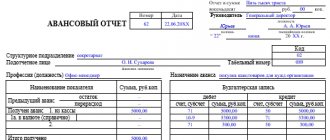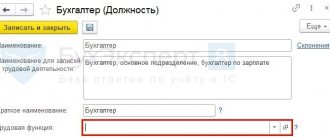This happened. Job. Error. “Write an explanatory note!” – pursed lips, a trained, bossy gaze. Such a requirement is fraught with bad and at the same time legal consequences. They can be minimized if you know what the document threatens, how and what to write about, and what to do. It’s good to have before your eyes a sample explanatory note about an error in your work. This article will talk about these things.
FREE CONSULTATION WITH A LAWYER
Tel.
+7 (800) 302-65-54 Free in Russia
Who needs it and why is it dangerous?
An explanatory note is drawn up by an employee when claims are made about non-fulfillment or improper performance of duties. It sets out the reasons for the current situation. On its basis, management determines whether the employee is guilty or not, and to what extent. Ultimately, the proceedings decide the issue of punishment. There are three options:
- termination of claims;
- forgiveness of the employee or verbal warning;
- disciplinary action.
Let's consider the last case.
The Labor Code of the Russian Federation (Article 192) allows disciplinary sanctions in the form of:
- comments,
- reprimand
- dismissals.
The employer has no right to use other punishments (including fines). At the same time, he can specify in the company’s internal documents the impact of these sanctions on bonuses.
Information about comments and reprimands is not included in the work book.
The employer has the right to dismiss an employee (Clause 5 of Article 81 of the Labor Code of the Russian Federation) if he fails to fulfill his job duties without good reason, if he already has an unresolved disciplinary sanction for the same reason. The latter is valid for 1 year.
A disciplinary sanction can be applied no later than 1 month from the date of discovery of the offense and 6 months from the date of its commission. For facts discovered during an audit, audit or financial inspection, this period is extended to 2 years.
An explanatory note is an integral part of the procedure, which can have far-reaching and unpleasant consequences for the employee. They can be reduced if you prepare the document correctly.
How to write an explanatory note at work about an incident: sample, template, examples
A workplace incident is an unintentional, sudden interruption of a process that may result in injury, death, loss of property, or other damage.
Depending on the type of incident and the employee’s guilt in it, punishment will follow. At best, this will be a reprimand and loss of bonus, and at worst, dismissal.
The explanatory note should truthfully describe the incident, noting your role in it. It is important to indicate the time accurately. In some cases, it is better to draft the text together with a lawyer.
How to write an explanatory note at work about an incident: sample, template, examples
To write or not to write
Is it possible to refuse to the authorities and not write an explanatory note? Yes, you can. The employee has this right. The administration's actions to force this are considered illegal.
On the other hand, the absence of a written explanation will not help the employee avoid disciplinary liability (Article 193 of the Labor Code of the Russian Federation). The employer will issue a certificate of refusal. The defendant's signature is not required. The foreclosure procedure will go further.
The provided explanatory note will document the employee’s valid reasons for the incident. She will not allow the administration to interpret his actions at its own discretion. The employee will better understand the vulnerabilities of his position.
What power does it have and what can it influence?
In most cases of an internal investigation, the explanatory note is the main document revealing the details and reasons for the violation that occurred.
The commission’s decision to punish the employee depends on its content, provided that it contains reliable information. But in some cases, when there is other evidence of the employee’s guilt (innocence), it will be just a formality necessary to comply with the procedure for conducting an official investigation.
The process has started
The employer can request an explanation in writing or orally. At the same time, he is obliged to describe the fact of the violation and demand an explanation. A written request is given on paper with a receipt stamp. It can take the form of a demand, order, instruction.
An oral request sparks debate among lawyers. One position: in this case, the employee should not be provided with a written explanation. It is necessary to politely insist on a paper version of the demand or give oral comments about the incident. The reason is the employer’s unrecorded claims. It will also be difficult for the latter to prove the fact of the request in court - witnesses will be required.
Another position: give an explanation even in the case of an oral request. Argument - if necessary, the employer will easily formalize the demand in writing and submit it to the court.
Softness should not be abused. If the boss cannot clearly say for what violation an explanation is required, then it is necessary to insist on a written request. It is better to do this with a written statement to the employer. It should show the situation in detail (dates, participants, uncertain requirements).
The head of the organization or a person authorized by him can request an explanatory note. If such an initiative comes from your immediate superior, it is not recommended to require him to confirm these rights. On the one hand, if the case goes to court, he will be interested in the legality of the penalty imposed, and not in the identity of the person who requested an explanation. The employer will confirm authority if necessary. On the other hand, such a requirement will further strain the employee’s relationship with the administration.
A written explanation is provided within two working days in accordance with the Labor Code of the Russian Federation. The day the request was received is not included.
You shouldn’t give in to pressure from your superiors and write an explanatory note “right now.” It is necessary to remove the first nervous excitement and analyze the situation in a calm atmosphere. Read the job description again. Consult a lawyer. Then start writing.
What are the reasons for an explanatory note at work?
There are many reasons why a manager may require a subordinate to describe an incident in an explanatory note. Among the most common:
- late
- no-show
- absence from work
- unauthorized leaving before the end of the working day (shift)
- refusal to perform duties
- errors in work
- failure to fulfill official duties
- detection of violations by commission, inspection
- violation of labor discipline
You should not immediately take hostility to the manager’s proposal to write an explanatory note. A written explanatory note is a statement by the employee of his own vision of the situation. This document will not allow superiors to interpret everything in their own way and punish an innocent subordinate.
IMPORTANT: The Criminal Code of Russia warns that no one is obliged to testify against himself. Therefore, if the facts stated in the explanatory note confirm the guilt of the employee, he is not obliged to write it.
If the manager has not received an explanation 48 hours after the employee was asked to provide it, he has the right to apply disciplinary punishment.
IMPORTANT: All explanatory notes are filed with the employee’s personal file and are stored for 75 years.
What are the reasons for an explanatory note at work?
Contents and sample
An explanatory note should be written with the expectation that it will eventually end up on the judge’s desk. The author’s goal is to clearly characterize himself as a law-abiding citizen, ready to perform the work provided for in the employment contract.
The manager does not have the right to influence the document: dictate the text, demand it be rewritten, indicate “this is not the reason.” The content of the explanatory note is determined by the employee.
The text of the note is laconic. Non-mandatory information may raise unnecessary questions from management. Jokes and colloquial expressions are inappropriate. The tone of the story is respectful. If the proceedings go to court, the reputation of a boor will not help win the case. The narrative is presented in chronological order in the first person.
The note recommends:
- confirm or deny the fact of violation;
- describe the circumstances of the event (date, time, place), its causes;
- characterize the guilt: intentional, due to negligence, its absence;
- bring witnesses;
- express an opinion on bringing to justice;
- describe your attitude towards further work.
The main content of the explanatory note is information about the reasons for the employee’s actions, which had negative consequences for the employer. The main recommendation: remember, find all the justifying circumstances and don’t be shy about citing them.
Explanatory errors from an educator, teacher (at school)
Head of GBOU "School No. 777"
Preschool educational institution No. 2 Kovalchuk L.M.
from the junior teacher of the second junior group
Terentyeva D.M.
Explanatory letter
On January 20, 2022, after the children woke up, I helped teacher A.L. Petrova. dress them. During the procedure, I used an inappropriate statement in front of the children. Thus, I violated labor discipline, which I deeply regret. From now on, I promise not to use such statements in front of children.
____________________ Terentyeva D.M. 20.01. 2022
To the school director
Afanasyeva E.G.
Explanatory letter
about disrupting a math lesson
in 4th "B" grade
I would like to inform you that on April 13, 2022, in accordance with the schedule, I was supposed to teach the first lesson of the 4th “B” grade. Due to the fact that the day before I had not studied the train schedule (which had been amended), I arrived at the bus station at the appointed time, and the departure time of my train was changed. Because of this, I was unable to arrive at work on time. Attached to the note is the revised train schedule.
Mathematics teacher ___________________ Afanasyeva E.G.
04/14/2021
Reasons for the error
Let's look at common options.
- High workload is a consequence of peak workload and understaffing. The explanation is good because it shifts the responsibility to the employer. Suitable for a small unit. Does not work in a large team working under the same conditions (at least formally). The management jealously guards its infallibility in the distribution of the workload. If the reputation of a lazy troublemaker is undesirable, it is better to find other reasons.
- Little experience - works in the case of a young specialist.
- Feeling unwell can serve as an excuse. The employee should emphasize that he worked in this state out of concern for the enterprise and the continuation of its rhythmic activities.
- Personal, family circumstances - it can help if the reason is serious. You should not abuse this remedy.
- An unclearly written, contradictory clause in the job description that allowed for misinterpretation. The argument is suitable for use, but it is better to first stock up on a certified copy of this document.
Sample note from a personnel officer in the personnel department
To the Director of JSC "Engineering"
Popkov V.G.
from the head of the HR department
Dmitrieva D.E.
Explanatory letter
about an error when preparing documents
On Wednesday, March 15, 2022, I incorrectly indicated the date in the document granting annual paid leave to P.D. Antsiferov. Because of this, Pavel Dmitrievich did not show up for work on time, for which he received a reprimand from his boss.
The mistake was made by me due to the high workload, because... On the 14th and 15th I was forced to go to work and work alone, because... my partner Lyutikova D.B. I found myself on sick leave at that time. It was precisely because of the heavy workload and lack of rest that at the end of the working day on the 15th, while drawing up the document, I was very tired and not attentive. I admit my guilt in what happened. From now on, I promise that I will take my work responsibilities more responsibly.
____________________ Dmitrieva D.E.
03/16/2022
What is regulated
In the legislation there is no such thing as an explanatory note, but according to Article 193 of the Labor Code of the Russian Federation (LINK), before punishing an employee, the employer is obliged to obtain from him a written explanation of the fact of the identified violation.
Traditionally in office work this document began to be called an explanatory note.
But this does not mean that if the employee calls this document differently, for example, “written explanations,” the employer has the right not to accept it.
That is, the explanatory note will not be a mandatory document if the investigation materials already contain the employee’s written explanations, named differently.
Questions and answers
When applying for the Civil Service, she did not intentionally indicate the wrong income on her income certificate.
Due to my inexperience, I (accidentally) hid an income of 20,000 rubles. They ask you to write an explanatory note. What should I write in it? Expert:
Anastasia, good afternoon! Write that when drawing up the declaration, I did not enter data regarding receipt of income in the amount of (so many) rubles for the period from... to....., due to the fact that at the time of submitting the declaration I did not have an extract on hand bank account (printout), which led to data distortion. The extract was received at a later date. I did not have any intention of hiding my income.
Expert:
Write what was accidentally left out due to the lack of all documentation.
The employer requires me to write an explanatory note in which he asks me to provide explanations regarding the facts of improper performance of official duties on my part.
1. My first mistake at work, about which the employer requires my explanation, occurred several years ago. The statute of limitations has passed. There was no disciplinary action. But now the employer has remembered this. Do I need to write an explanation about this?
2. I was instructed to develop technical specifications within a specified time frame. I did not meet the deadlines. But in my job description there is no such clause that I have to develop technical specifications. How to write an explanation in this case?
Expert:
Catherine.
Article 189 of the Labor Code of the Russian Federation establishes that labor discipline is obligatory for all employees to obey the rules of conduct determined in accordance with the Labor Code of the Russian Federation, other laws, collective agreements, agreements, employment contracts, and local regulations of the organization. Thus, in order to apply a disciplinary sanction to an employee, the employer must determine whether the employee violated his job duties established by the employment contract or job description. The employee’s job responsibilities also include compliance with internal labor regulations, labor safety instructions and other local regulations that exist in the company and with which the employee was also familiarized when hired (Article 68 of the Labor Code of the Russian Federation) or when they are changed, or introduction (Article 22 of the Labor Code of the Russian Federation). To confirm that the employee has familiarized himself with the established requirements, in the event of a conflict, the employer will need to prove the fact of familiarization, therefore, the employee’s signature and personally affixed date of familiarization is a key point in confirming the legality of applying a disciplinary sanction in the future.
The employer must make sure that the violation committed by the employee corresponds to all the signs of a disciplinary offense (Article 192 of the Labor Code of the Russian Federation) - non-fulfillment or improper fulfillment by the employee (through the fault of the employee) of the labor duties assigned to him. In such a situation, the following circumstances must simultaneously be present: 1. Performing certain actions (or refraining from performing them) was the employee’s labor duty. If the case is heard in court, the employer will need to prove that the action for which the penalty was imposed was actually within the scope of the employee’s duties; 2. Labor duties must not be performed or performed improperly. Failure to fulfill the obligation must be proven: provide testimony of witnesses, documents (for example, a time sheet), etc. In case of improper performance, the employee’s obligation to perform certain actions in a different (proper) way must arise from the situation (for example, if after cleaning there is a spill on the floor coffee - cleaning was not proper) or enshrined in documents (for example, the job description of the secretary provides for the obligation to submit correspondence to the manager no later than an hour after receiving it); 3. The employee’s behavior must be unlawful (that is, not comply with the law and obligations under the employment contract). Disciplinary action cannot be imposed for lawful behavior. For example, an employee who refuses to divide annual leave into parts or who fails to comply with the employer’s order to recall him from leave cannot be brought to disciplinary liability (Article 125 of the Labor Code of the Russian Federation); 4. Illegal behavior must be related to the employee’s performance of work duties. A penalty cannot be imposed for refusal to carry out a public order or violation of the rules of behavior in public places; 5. The employee's conduct must be culpable (i.e., intentional or reckless). A penalty cannot be imposed if there are valid reasons why the employee was unable to fulfill the duty properly, for example: - lack of necessary materials, working conditions; — disability; - summons to court, to law enforcement agencies; — floods, snowfalls and other natural disasters; - failure to complete a task due to the fulfillment of other instructions, if it was impossible to complete everything at the same time. If at least one of these circumstances is absent, then a penalty cannot be imposed, since the employee’s behavior is not a disciplinary offense. Of course, for a disciplinary violation, the manager has the right to reprimand his subordinate. The procedure is described quite clearly and in detail by Article 193 of the Labor Code of the Russian Federation: 1. Before applying a disciplinary sanction, the employer must request a written explanation from the employee. If after two working days the employee does not provide the specified explanation, then a corresponding act is drawn up. 2. Failure by an employee to provide an explanation is not an obstacle to applying a disciplinary sanction. 3. Disciplinary action is applied no later than one month from the date of discovery of the misconduct, not counting the time of illness of the employee, his stay on vacation, as well as the time necessary to take into account the opinion of the representative body of employees. 4. A disciplinary sanction cannot be applied later than six months from the date of commission of the offense, and based on the results of an audit, inspection of financial and economic activities or an audit - later than two years from the date of its commission. The specified time limits do not include the time of criminal proceedings. 5. For each disciplinary offense, only one disciplinary sanction can be applied. 6. The employer’s order (instruction) to apply a disciplinary sanction is announced to the employee against signature within three working days from the date of its publication, not counting the time the employee is absent from work. If the employee refuses to familiarize himself with the specified order (instruction) against signature, then a corresponding act is drawn up. 7. A disciplinary sanction can be appealed by an employee to the state labor inspectorate and (or) bodies for the consideration of individual labor disputes. Thus, based on the norms of paragraph 1 of Art. 193 of the Labor Code of the Russian Federation defines the employer’s obligation to receive written explanations from the employee, and the norms of paragraphs 3 and 4 of Art. 193 of the Labor Code of the Russian Federation, a time interval is established for applying a disciplinary sanction. Failure to comply with the above mandatory norms of labor legislation eliminates the ability of the employer to bring the employee to administrative responsibility. As for the form of writing an explanatory note, it is arbitrary, the most important thing is that you can reflect in it the fact that your job responsibilities do not include the performance of this type of work.
What to do if an employee does not admit guilt
In response to management’s demand to write about his mistake, the employee may refuse.
This means the following:
- he denies the fact of its commission;
- does not admit responsibility for what happened;
- doesn't want to talk about this situation.
Employee behavior
In this case, the employee draws up a refusal in writing.
It consists of the following components:
- “hat” in the upper right corner, where the addressee is indicated - the manager;
- title: “REFUSAL TO GIVE A WRITTEN EXPLANATION”;
- description of the incident;
- listing the reasons for your reluctance to provide written explanations;
- date of;
- signature;
- transcript.
Administration actions
Based on the refusal presented, the employer draws up an act recording the receipt of this document from the employee.
Based on this, he has the right to apply disciplinary action.
